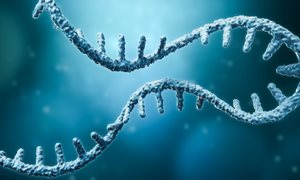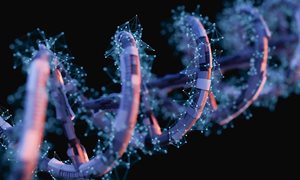
Apathy predicts some forms of dementia years before the first symptoms appear. This is the main finding of Rogier Kievit of Radboudumc and colleagues from the University of Cambridge in their publication today in Alzheimer's & Dementia. With this knowledge, potential treatment can be started considerably earlier.
Fronto-temporal dementia is an important form of dementia in humans, and is often first diagnosed between the ages of 45 and 65. This type of dementia changes people's behaviour, language and personality. Typical symptoms are: impulsive, socially inappropriate and repetitive, compulsive behaviour. Apathy - a lack of interest, initiative and motivation - is also a general characteristic of this disorder. Apathy reduces functioning, independence and quality of life and is often accompanied by lower life expectancy.
Shrinkage
Brain scans in these patients suggest that the cause of this condition is related to the shrinkage of specific brain parts at the front of the brain. Rogier Kievit, Professor of Developmental Neuroscience at Radboudumc and the Donders Institute: "The stronger the shrinkage, the stronger the apathy. By the way, apathy should not be confused with depression or laziness. The interesting thing about our findings is that apathy often occurs years earlier than the other symptoms of the disease. This potentially makes it possible to treat and inhibit the disease and its symptoms much earlier. It shows how essential it is to be able to monitor these processes in large groups of people over time."
In the family
Fronto-temporal dementia often has a genetic cause. In about a third of patients it runs in the family. The study, led by Kievit, Maura Malpetti and James Rowe (University of Cambridge), monitored 600 people for several years, looking at changes in apathy, memory test results and brain scans.
More than three hundred people (304) had the gene variant that increased the risk of the disease, but were still healthy. The other half of the group (296) were family members without the gene variant. Nobody had dementia. Most people did not know whether or not they were carriers of the pathogenic gene.

Maura Malpetti, first author of the article, said: "People with the genetic mutation that increases the risk of fronto-temporal dementia were more apathetic than their families and the severity of the apathy also increased more rapidly during the research period. We saw the brain areas involved in motivation and initiative shrink years before the other symptoms of dementia appeared. Apathy is a clear predictor of cognitive decline, which also accelerates as the symptom formation approaches".
Wake-up-call
The study reveals that apathy is an important early predictor of fronto-temporal dementia. At the same time, it must be clear where apathy comes from. Rowe: "Apathy can have various causes, such as a lack of thyroid hormone in the blood or depression. But this research is a wake-up call. It shows that it's good to include the risk of dementia in the considerations."
Kievit: "Especially if it is known that fronto-temporal dementia has occurred in the family before. We do not yet have good, effective medication against the condition, but the period in which we can intervene has now been considerably increased by our research."
Related news items

Five million euro’s for joint research on rare movement disorders
29 March 2022 A Dutch consortium will receive almost 5 million euro’s from NWO to jointly start an ambitious project, called CureQ, on various rare and genetic brain disorders that lead to abnormal movements. Bart van de Warrenburg was one of the main applicants of this ‘Nationale Wetenschaps Agenda (NWA)’ grant. go to page
Development of RNA therapy for rare movement disorder SCA7 Brain Foundation grant for Radboudumc and LUMC
3 February 2022 Neurologist Bart van de Warrenburg, together with Willeke van Roon-Mom and Annemieke Aartsma-Rus (both LUMC/Dutch Center for RNA Therapeutics), has been awarded 400,000 euros by the Dutch Brain Foundation to develop a genetic therapy for the rare hereditary movement disorder SCA7. go to page
Aerobe exercise has a positive effect on brain function in Parkinson's disease patients
18 January 2022 Radboudumc researchers have shown that the brain function of patients with Parkinson's disease improved with regular exercise, which seems to strengthen the connections between different brain areas, while inhibiting brain shrinkage. go to page
New genetic defect links cell biology and protein glycosylation
10 November 2021 Peter Linders, Dirk Lefeber and Geert van den Bogaart together with international colleagues have recently reported on novel cell biological insights, by identifying a genetic disorder in syntaxin-5 which allowed to unravel a new mechanism regulating intracellular transportation. go to page
Impact of COVID-19 pandemic on mental health of Parkinson's patients
10 November 2021 The COVID-19 pandemic has introduced challenges to the social life and care of people with Parkinson’s disease (PD), which could potentially worsen mental health problems. A new study investigated this associaten and explored whether mental health and quality of life can be improved. go to page